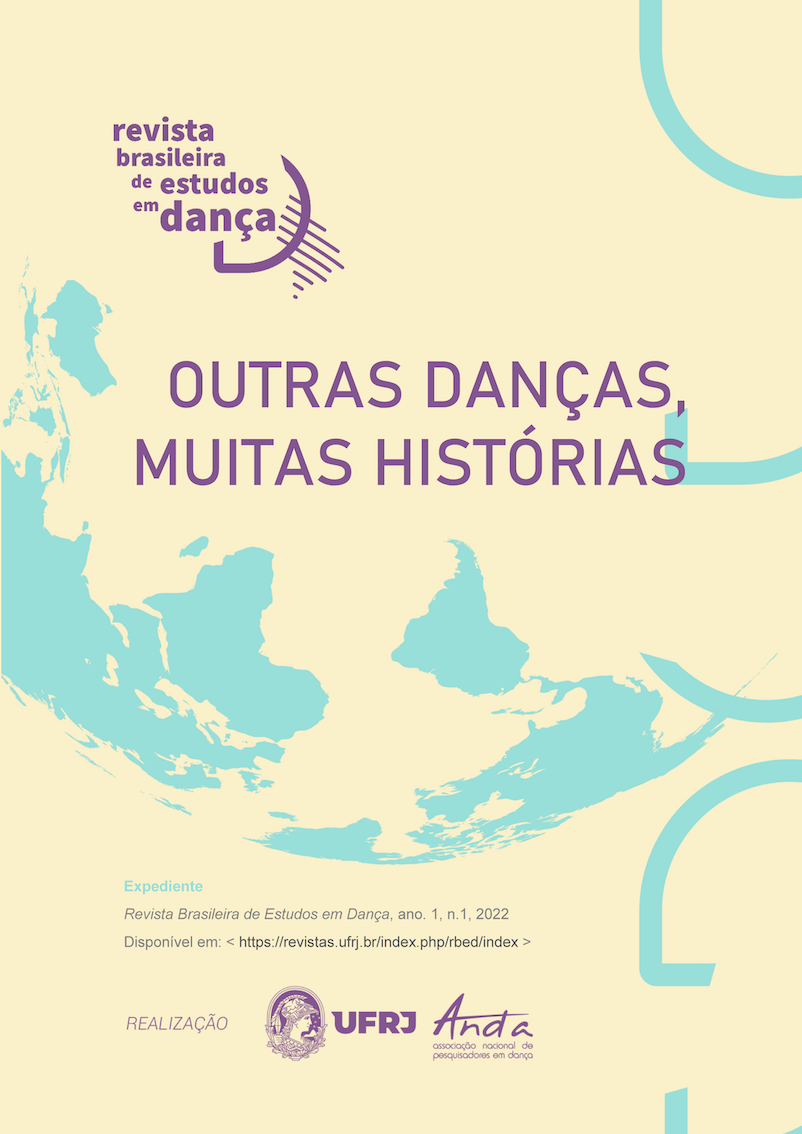Decolonising Dance History
DOI:
https://doi.org/10.58786/rbed.2022.v1.n1.53729Keywords:
Dance History, Indian dance, DecolonizationReferences
BANERJI, A. Odissi Dance: Paratopic Performances of Gender, Law, and Nation. Tese de Doutorado. New York: New York University, 2010.
BOSE, M. Speaking of Dance:The Indian Critique. New Delhi: D.K. Printword, 2001.
CHAKRAVORTY, P. Bells of Change: Kathak Dance,Women and Modernity in India, Calcutta: Seagull Books, 2008.
CHAKRAVORTY, P. Remixed Practice: Bollywood Dance and the Global Indian. In: CHAKRAVORTY, P; GUPTA, N. (eds.) Dance Matters: Performing India. New Delhi: Oxford University Press, 2010.
CHATTERJEA, A. Contestations: Constructing a Historical Narrative for Odissi. In: CARTER, A. (ed.) Rethinking Dance History: A Reader, London: Routledge, 2004, pp. 143–156.
CHATTERJEA, A. Red-Stained Feet: Probing the Ground on Which Women Dance in Contemporary Bengal. In: FOSTER, S.L. (ed.) Worlding Dance, Basingstoke: Palgrave Macmillan, 2009.
COORLAWALA, U.A. Classical and Contemporary Indian Dance: Overview, Criteria and a Choreographic Analysis. Tese de Doutorado. New York: New York University, 1994.
GRAMSCI, A. Selections from the Prison Notebooks. London: Lawrence and Wishart, 1971.
GUHA, R (ed.). Subaltern Studies:Writings on South Asian Society and History. New Delhi: Oxford University Press, 1982.
GUHA, R. (ed.) Dominance without Hegemony: History and Power in Colonial India, Cambridge, MA: Harvard University Press, 1997.
KEDHAR, A. Flexibility and Its Bodily Limits: Transnational South Asian Dancers in an Age of Neoliberalism. Dance Research Journal, 46:1, 23–40, 2014.
KERSENBOOM-STORY, S.C. Nityasumangali: Devadasi Tradition in South Asia, New Delhi: Motilal Banarsidass, 1987.
LOPEZ Y ROYO, A. Classicism, Post-Classicism and Ranjabati Sircar’s Work: Redefining the Terms of Indian Contemporary Dance Discourses. South Asia Research, 23:1, 2003, 153–169.
MEDURI, A. Rukmini Devi Arundale (1904–1986):AVisionary Architect of Indian Culture and the Performing Arts, New Delhi: Motilal Banarsidass, 2005.
O’SHEA, J. At Home in the World: Bharata Natyam on the Global Stage, Middle- town: Wesleyan University Press, 2007.
PURKAYASTHA, P. Indian Modern Dance, Feminism and Transnationalism, Basingstoke: Palgrave Macmillan, 2014.
PURKAYASTHA, P. Women in Revolutionary Theatre: IPTA, Labor, and Perfor- mance. Asian Theatre Journal, 32:2, 2015, pp. 518–535.
ROY CHOWDHURY, R. Jibaner Taney Shilper Taney, Calcutta: Thema, 1999.
SAID, E.W. Orientalism, New York: Vintage Books, 1995.
SARKAR MUNSI, U. Tale of the Professional Woman Dancer in Folk Traditions in India: Commodification of Dance and the Traditional Dancing Women. In: DUTT, B.; SARKAR Munsi, U. (eds.) Engendering Performance: Indian Women Performers in Search of an Identity. New Delhi: SAGE, 2010.
SETH, S. Which Past? Whose Transcendental Presupposition? Postcolonial Studies, 11:2, 2008, pp. 215–226.
SONEJI, D. Unfinished Gestures: Devadasis, Memory, and Modernity in South India, Chicago: University of Chicago Press, 2012.
SPIVAK, G.C. Can the Subaltern Speak. In: NELSON, C.; GROSSBERG, L. (eds.) Marxism and the Interpretation of Culture, Urbana: University of Illinois Press, 1988, pp. 271–313.
SRINIVASAN, A. Reform and Revival: The Devadasi and Her Dance. Economic and PoliticalWeekly, 20:44, 1985, pp. 1869–1876.
SRINIVASAN, P. Sweating Saris: Indian Dance as Transnational Labor, Philadelphia: Temple University Press, 2012.
VATSYAYAN, K. Indian Classical Dance, New Delhi: Ministry of Information and Broadcasting, Govt. of India, 1974.
Downloads
Published
Versions
- 2024-05-10 (3)
- 2023-11-30 (2)
- 2022-07-31 (1)
How to Cite
Issue
Section
License
Authors who publish in the Revista Brasileira de Estudos em Dança are
responsible for the content of signed articles and retain copyright.
They grant the journal the right of first publication with the work simultaneously
licensed under the Creative Commons Attribution-NonCommercial 4.0 License
(Open Archives Initiative - OAI). This feature, used for open-access journals,
allows sharing work for non-commercial purposes and acknowledges
authorship. If the text is later published in another vehicle, the author
must inform that it was initially published as an article in the Revista Brasileira
de Estudos em Dança. Therefore, even if the journal owns the first publication,
authors are entitled to publish their work in institutional repositories or on
their personal pages, even if the editorial process has not been completed.
The journal reserves the right to make normative, orthographic, and grammatical changes to maintain the language standard, respecting the authorial style.

